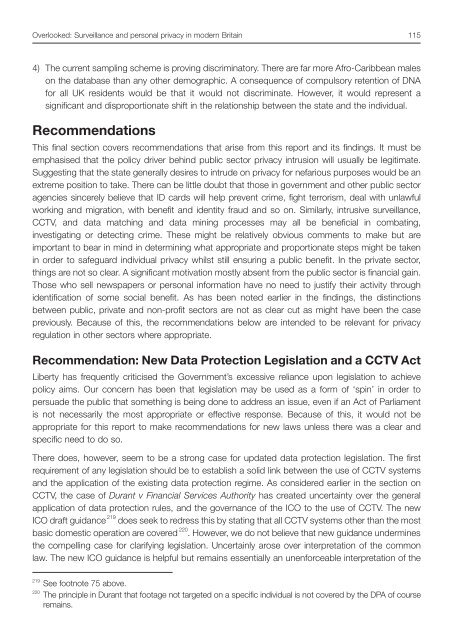Overlooked - Liberty
Overlooked - Liberty
Overlooked - Liberty
You also want an ePaper? Increase the reach of your titles
YUMPU automatically turns print PDFs into web optimized ePapers that Google loves.
<strong>Overlooked</strong>: Surveillance and personal privacy in modern Britain 115<br />
4) The current sampling scheme is proving discriminatory. There are far more Afro-Caribbean males<br />
on the database than any other demographic. A consequence of compulsory retention of DNA<br />
for all UK residents would be that it would not discriminate. However, it would represent a<br />
significant and disproportionate shift in the relationship between the state and the individual.<br />
Recommendations<br />
This final section covers recommendations that arise from this report and its findings. It must be<br />
emphasised that the policy driver behind public sector privacy intrusion will usually be legitimate.<br />
Suggesting that the state generally desires to intrude on privacy for nefarious purposes would be an<br />
extreme position to take. There can be little doubt that those in government and other public sector<br />
agencies sincerely believe that ID cards will help prevent crime, fight terrorism, deal with unlawful<br />
working and migration, with benefit and identity fraud and so on. Similarly, intrusive surveillance,<br />
CCTV, and data matching and data mining processes may all be beneficial in combating,<br />
investigating or detecting crime. These might be relatively obvious comments to make but are<br />
important to bear in mind in determining what appropriate and proportionate steps might be taken<br />
in order to safeguard individual privacy whilst still ensuring a public benefit. In the private sector,<br />
things are not so clear. A significant motivation mostly absent from the public sector is financial gain.<br />
Those who sell newspapers or personal information have no need to justify their activity through<br />
identification of some social benefit. As has been noted earlier in the findings, the distinctions<br />
between public, private and non-profit sectors are not as clear cut as might have been the case<br />
previously. Because of this, the recommendations below are intended to be relevant for privacy<br />
regulation in other sectors where appropriate.<br />
Recommendation: New Data Protection Legislation and a CCTV Act<br />
<strong>Liberty</strong> has frequently criticised the Government’s excessive reliance upon legislation to achieve<br />
policy aims. Our concern has been that legislation may be used as a form of ‘spin’ in order to<br />
persuade the public that something is being done to address an issue, even if an Act of Parliament<br />
is not necessarily the most appropriate or effective response. Because of this, it would not be<br />
appropriate for this report to make recommendations for new laws unless there was a clear and<br />
specific need to do so.<br />
There does, however, seem to be a strong case for updated data protection legislation. The first<br />
requirement of any legislation should be to establish a solid link between the use of CCTV systems<br />
and the application of the existing data protection regime. As considered earlier in the section on<br />
CCTV, the case of Durant v Financial Services Authority has created uncertainty over the general<br />
application of data protection rules, and the governance of the ICO to the use of CCTV. The new<br />
ICO draft guidance 219 does seek to redress this by stating that all CCTV systems other than the most<br />
basic domestic operation are covered 220 . However, we do not believe that new guidance undermines<br />
the compelling case for clarifying legislation. Uncertainly arose over interpretation of the common<br />
law. The new ICO guidance is helpful but remains essentially an unenforceable interpretation of the<br />
219<br />
See footnote 75 above.<br />
220<br />
The principle in Durant that footage not targeted on a specific individual is not covered by the DPA of course<br />
remains.















